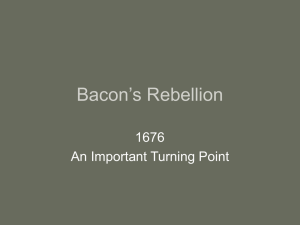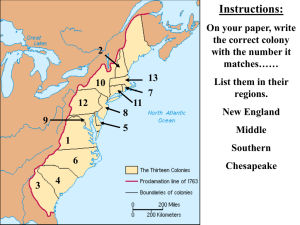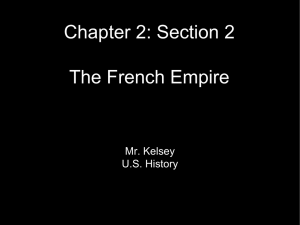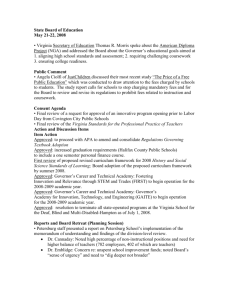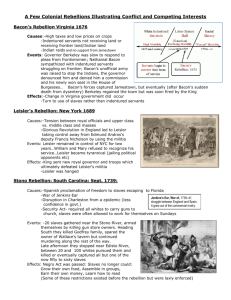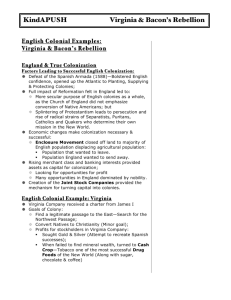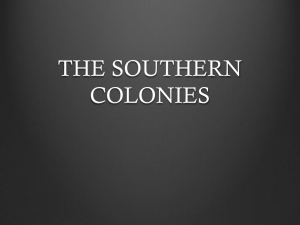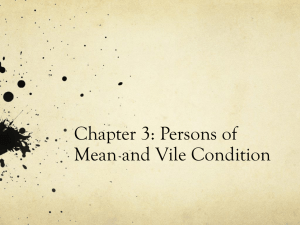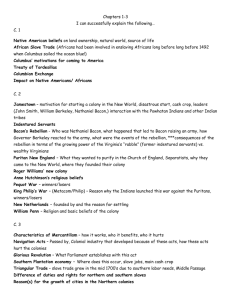Bacon's Rebellion - National Humanities Center
advertisement
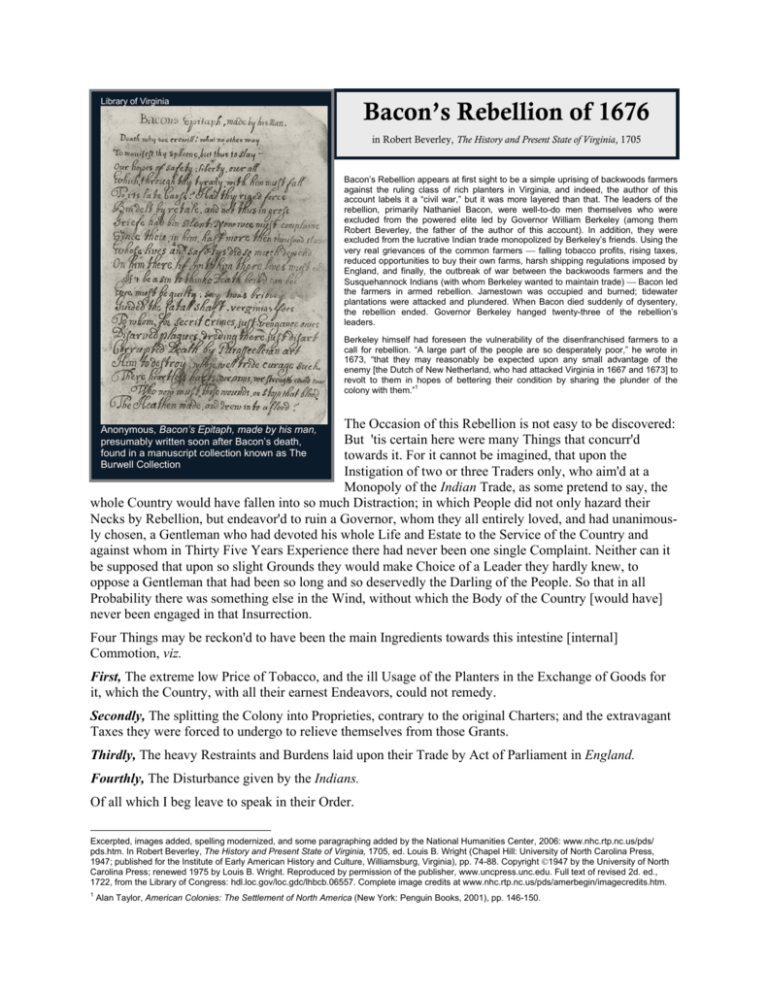
Library of Virginia Bacon’s Rebellion of 1676 in Robert Beverley, The History and Present State of Virginia, 1705 * Bacon’s Rebellion appears at first sight to be a simple uprising of backwoods farmers against the ruling class of rich planters in Virginia, and indeed, the author of this account labels it a “civil war,” but it was more layered than that. The leaders of the rebellion, primarily Nathaniel Bacon, were well-to-do men themselves who were excluded from the powered elite led by Governor William Berkeley (among them Robert Beverley, the father of the author of this account). In addition, they were excluded from the lucrative Indian trade monopolized by Berkeley’s friends. Using the very real grievances of the common farmers falling tobacco profits, rising taxes, reduced opportunities to buy their own farms, harsh shipping regulations imposed by England, and finally, the outbreak of war between the backwoods farmers and the Susquehannock Indians (with whom Berkeley wanted to maintain trade) Bacon led the farmers in armed rebellion. Jamestown was occupied and burned; tidewater plantations were attacked and plundered. When Bacon died suddenly of dysentery, the rebellion ended. Governor Berkeley hanged twenty-three of the rebellion’s leaders. Berkeley himself had foreseen the vulnerability of the disenfranchised farmers to a call for rebellion. “A large part of the people are so desperately poor,” he wrote in 1673, “that they may reasonably be expected upon any small advantage of the enemy [the Dutch of New Netherland, who had attacked Virginia in 1667 and 1673] to revolt to them in hopes of bettering their condition by sharing the plunder of the colony with them.”1 The Occasion of this Rebellion is not easy to be discovered: But 'tis certain here were many Things that concurr'd towards it. For it cannot be imagined, that upon the Instigation of two or three Traders only, who aim'd at a Monopoly of the Indian Trade, as some pretend to say, the whole Country would have fallen into so much Distraction; in which People did not only hazard their Necks by Rebellion, but endeavor'd to ruin a Governor, whom they all entirely loved, and had unanimously chosen, a Gentleman who had devoted his whole Life and Estate to the Service of the Country and against whom in Thirty Five Years Experience there had never been one single Complaint. Neither can it be supposed that upon so slight Grounds they would make Choice of a Leader they hardly knew, to oppose a Gentleman that had been so long and so deservedly the Darling of the People. So that in all Probability there was something else in the Wind, without which the Body of the Country [would have] never been engaged in that Insurrection. Anonymous, Bacon’s Epitaph, made by his man, presumably written soon after Bacon’s death, found in a manuscript collection known as The Burwell Collection Four Things may be reckon'd to have been the main Ingredients towards this intestine [internal] Commotion, viz. First, The extreme low Price of Tobacco, and the ill Usage of the Planters in the Exchange of Goods for it, which the Country, with all their earnest Endeavors, could not remedy. Secondly, The splitting the Colony into Proprieties, contrary to the original Charters; and the extravagant Taxes they were forced to undergo to relieve themselves from those Grants. Thirdly, The heavy Restraints and Burdens laid upon their Trade by Act of Parliament in England. Fourthly, The Disturbance given by the Indians. Of all which I beg leave to speak in their Order. * Excerpted, images added, spelling modernized, and some paragraphing added by the National Humanities Center, 2006: www.nhc.rtp.nc.us/pds/ pds.htm. In Robert Beverley, The History and Present State of Virginia, 1705, ed. Louis B. Wright (Chapel Hill: University of North Carolina Press, 1947; published for the Institute of Early American History and Culture, Williamsburg, Virginia), pp. 74-88. Copyright 1947 by the University of North Carolina Press; renewed 1975 by Louis B. Wright. Reproduced by permission of the publisher, www.uncpress.unc.edu. Full text of revised 2d. ed., 1722, from the Library of Congress: hdl.loc.gov/loc.gdc/lhbcb.06557. Complete image credits at www.nhc.rtp.nc.us/pds/amerbegin/imagecredits.htm. 1 Alan Taylor, American Colonies: The Settlement of North America (New York: Penguin Books, 2001), pp. 146-150. First, Of the low Price of Tobacco, and the Disappointment of all Sort of Remedy, I have spoken sufficiently before.2 Secondly, Of splitting the Country into Proprieties. King Charles the Second, to gratify some Nobles about him, made two great Grants out of that Country [Carolina]. These Grants were not of the uncultivated Wood-Land only, but also of Plantations, which for many Years had been seated and improv'd, under the Encouragement of several Charters granted by his Royal Ancestors to that Colony. Those Grants were distinguished by the Names of the Northern and Southern Grants of Virginia, and the same Men were concern'd in both. They were kept dormant some Years after they were made, and in the Year 1674 begun to be put in Execution. As soon as ever the Country came to know this, they remonstrated against them; and the Assembly drew up an humble Address to his Majesty, complaining of the said Grants, as derogatory to the previous Charters and Privileges granted to that Colony, by his Majesty and his Royal Progenitors. . . . Thirdly, Upon the Back of all these Misfortunes came out the Act of 25 Car. II. for better securing the Plantation Trade. By this Act several Duties were laid on the Trade from one Plantation to another. This was a new Hardship, and the rather, because the Revenue arising by this Act was not applied to the Use of the Plantation wherein it was raised: But given clear away; nay, in that Country it seem'd to be of no other Use but to burden the Trade or create a good Income to the Officers; for the Collector had Half, the Comptroller a Quarter, and the remaining Quarter was subdivided into Salaries, till it was lost. . . . Library of Congress Herman Moll, This map of North America, 1715, detail [Fourthly,] These were the Afflictions that Country labor'd under when the fourth Accident happen'd, viz. The Disturbance offer'd by the Indians to the Frontiers. This was occasion'd [caused], First, By the Indians on the Head of the [Chesapeake] Bay. Secondly, By the Indians on their own Frontiers. First, The Indians at the Head of the Bay drove a constant Trade with the Dutch in Monadas, now call'd New-York; and to carry on this, they used to come every Year by the Frontiers of Virginia, to hunt and purchase Skins and Furs of the Indians to the Southward. This Trade was carried on peaceably while the Dutch held Monadas; and the Indians used to call on the English in Virginia on their Return, to whom they would sell Part of their Furs, and with the rest go on to Monadas. But after the English came to possess that Place [in 1664] and understood the Advantages the Virginians made by the Trade of their Indians, they inspired them with such a Hatred to the Inhabitants of Virginia that, instead of coming 2 On Jamestown in 1621: “The people began to grow numerous, Thirteen Hundred settling there that Year; which was the Occasion of making so much Tobacco, as to overstock the Market. Wherefore his Majesty, out of Pity to the Country, sent his Commands, That they should not suffer [allow] their Planters to make above One Hundred Pounds of Tobacco per Man; for the Market was so low, that he cou'd not afford to give 'em above Three Shillings the Pound for it. He advised them to turn their spare Time towards providing Corn and Stock, and towards the Making of Potash, or other Manufactures.” [Beverley, The History and Present State of Virginia, 1705, ed. Louis B. Wright, pp. 49-50] National Humanities Center 2 peaceably to trade with them, as they had done for several Years before, they afterwards never came but only to commit Robberies and Murders upon the People. Secondly, The Indians upon their own Frontiers were likewise inspir'd with ill Thoughts of 'em. For their Indian Merchants had lost a considerable Branch of their Trade they knew not how; and apprehended the Consequences of [Governor] Sir William Berkeley’s intended Discoveries, which were espoused by the Assembly, might take away the remaining Part of their Profit. This made them very troublesome to the Neighbor Indians; who on their Part, observing an unusual Uneasiness in the English, and being terrified by their rough Usage, immediately suspected some wicked Design against their Lives and so fled to their remoter Habitations. This confirm'd the English in the Belief that they had been the Murderers, till at last they provoked them to be so in earnest. Library of Congress This Addition of Mischief to Minds already full of Discontent made People ready to vent all their Resentment against the poor Indians. There was nothing to be got by Tobacco; neither could they turn any other Manufacture to Advantage; so that most of the poorer Sort were willing to quit their unprofitable Employments, and go Voluntiers [volunteers] against the Indians. At first they flock'd together tumultuously, running in Troops from one Plantation to another without a Head; till at last the seditious Humor [temperament] of Colonel Nath. Bacon led him to be of the Party. This Gentleman had been brought up at one of the Inns of Court in England and had a moderate Fortune. He was young, bold, active, of an inviting Aspect, and powerful Elocution. In a Word, he was every way qualified to head a giddy and unthinking Multitude. Before he had been three Years in the Country, he was, for his extraordinary Qualifications, made one of the Council, and in great Honor and Esteem among the People. For this reason he no sooner gave Countenance to this riotous Mob, but they all presently fixed their Eyes upon him for their General, and accordingly made their R “S . NATHANIEL BACON. From an Original at the Addresses to him. As soon as he found this, he harangued Lord Viscount Grimston’s, at Gorhambury” th them publicly. He aggravated the Indian Mischiefs, (England), late 18 -century engraving complaining that they were occasion'd for Want of a due “in every way qualified to head Regulation of their Trade. He recounted particularly the a giddy and unthinking Multitude” other Grievances and Pressures they lay under; and pretended that he accepted of their Command with no other Intention but to do them and the Country Service, in which he was willing to encounter the greatest Difficulties and Dangers. He farther assured them he would never lay down his Arms till he had revenged their Sufferings upon the Indians and redressed all their other Grievances. By these Insinuations he wrought his Men into so perfect an Unanimity that they were one and all at his Devotion. He took care to exasperate them to the utmost by representing all their Misfortunes. After he had begun to muster them, he dispatch'd a Messenger to the Governor, by whom he aggravated the Mischiefs done by the Indians, and desired a Commission of General to go out against them. This Gentleman was in so great Esteem at that time with the Council that the Governor did not think fit to give him a flat Refusal: But sent him Word he would consult the Council and return him a farther Answer. In the meantime, Bacon was expeditious in his Preparations, and having all things in Readiness, began his March depending on the Authority the People had given him. He would not lose so much Time as to stay National Humanities Center 3 for his Commission; but dispatched several Messengers to the Governor to hasten it. On the other hand, the Governor, instead of a Commission, sent positive Orders to him to disperse his Men and come down in Person to him, upon Pain of being declared a Rebel. This unexpected Order was a great Surprise to Bacon and not a little Trouble to his Men. However, he was resolved to prosecute his first Intentions, depending upon his Strength and Interest with the People. Nevertheless, he intended to wait upon the Governor, but New York Public Library not altogether defenseless. Pursuant to this Resolution, he took about Forty of his Men down with him in a Sloop to James-Town, where the Governor was with his Council. Matters did not succeed there to Mr. Bacon’s Satisfaction; wherefore he express'd himself a little too freely. For which being suspended from the Council, he went away again in a Huff with his Sloop and Followers. The Governor fill'd a Long-Boat with Men and pursued the Sloop so close that Colonel Bacon removed into his Boat to make more Haste. But the Governor had sent up by Land to the Ships at Sandy-Point, where he was stopp'd and sent down again. Upon his Return he was kindly received by the Governor who, knowing he had gone a Step beyond his Instructions in having suspended him, was glad to admit him again of the Council; after which he hoped all things might be pacified. Notwithstanding this, Col. Bacon still insisted upon a Commission to be General of the Voluntiers and to go out against the Indians; from which the Governor endeavor'd to dissuade him, but to no Purpose, because he had some Sir William Berkeley, governor of Virginia, secret Project in View. He had the Luck to be 1641-1652, 1660-1677 countenanced in his Importunities by the News of fresh Murder and Robberies committed by the Indians. However, not being able to accomplish his Ends by fair Means, he stole privately out of Town; and having put himself at the Head of six hundred Voluntiers, marched directly to James-Town, where the Assembly was then fitting. He presented himself before the Assembly and drew up his Men in Battalia before the House wherein they sat. He urged to them his Preparations and alleged that, if the Commission had not been delayed so long, the War against the Indians might have been finish'd. The Governor resented this insolent Usage worst of all, and now obstinately refused to grant him any thing, offering his naked Breast against the presented Arms of his Followers. But the Assembly, fearing the fatal Consequence of provoking a discontented Multitude ready arm'd, who had the Governor, Council, and Assembly entirely in their Power, address'd the Governor to grant Bacon his Request. They prepar'd themselves the Commission, constituting him General of the Forces of Virginia, and brought it to the Governor to be sign'd. With much Reluctancy his Excellency sign'd it and thereby put the Power of War and Peace into Bacon’s Hands. Upon this he march'd away immediately, having gained his End, which was in effect a Power to secure a Monopoly of the Indian Trade to himself and his Friends. As soon as General Bacon had march'd to such a convenient Distance from James-Town, that the Assembly thought they might deliberate with Safety, the Governor, by their Advice, issued a Proclamation of Rebellion against him, commanding his Followers to surrender him and forthwith disperse themselves. Not contented with this, he likewise gave Orders at the same time for raising the Militia of the Country against him. National Humanities Center 4 The People being much exasperated, and General Bacon by his Address and Eloquence having gain'd an absolute Dominion over their Hearts, they unanimously resolved that not a Hair of his Head shou'd fall to the Ground, much less that they shou'd surrender him as a Rebel. Therefore they kept to their Arms, and instead of proceeding against the Library of Congress Indians, they march'd back to JamesTown; directing their Fury against such of their Friends and Countrymen as should dare to oppose them. The Governor, seeing this, fled over the Bay to Accomack, whither he hoped the Infection of Bacon’s Conspiracy had not reach'd. But there, instead of People’s receiving him with open Arms, in Remembrance of the former Services he had done them; they began to make Terms with him for Redress of their Grievances, and for the Ease and Liberty of Trade. Thus Sir “Bacon’s Castle”: home of Virginia planter Arthur Allen occupied for four William, who had been almost the months by seventy of Bacon’s men as their headquarters; Surry County, Idol of the People, was, by reason of Virginia (photograph after 1933). the loyal Part he acted, abandon'd by all, except some few who went over to him from the Western Shore in Sloops and Boats.3 So that it was some time before he could make head against Bacon: But he left him to range through the country at Discretion. General Bacon at first held a Convention of such of the chief Gentlemen of the Country as would come to him, especially of those about Middle-Plantations,4 who were near at Hand. At this Convention they made a Declaration to justify his unlawful Proceedings and obliged People to take an Oath of Obedience to him as their General. Then, by their Advice, on Pretense of the Governor’s Abdication, he call'd an Assembly, by Writs signed by himself, and four others of the Council. The Oath was Word-for-Word as follows. W hereas the Country hath raised an Army against our common Enemy the Indians, and the same under the Command of General Bacon, being upon the Point to march forth against the said common Enemy, hath been diverted, and necessitated to move to the suppressing of Forces, by evil disposed Persons raised against the said General Bacon, purposely to foment and stir up Civil War among us, to the Ruin of this his Majesty’s Country. And, Whereas it is notoriously manifest, that Sir William Berkeley, Knight, Governor of the Country, assisted, counselled and abetted by those evil disposed Persons aforesaid, hath not only commanded, fomented and stirr'd up the People to the said Civil War; but failing therein, hath withdrawn himself, to the great Astonishment of the People, and the Unsettlement of the Country. And, Whereas the said Army, raised by the Country for the Causes aforesaid, remain full of Dissatisfaction in the Middle of the Country, expecting Attempts from the said Governor and the evil Councilors aforesaid. And since no proper Means have been found out for the Settlement of the Distractions, and preventing the horrid Outrages and Murders daily committed in many Places of the Country by the barbarous Enemy; It hath been thought fit by the said General, to call unto him all such sober and discreet Gentlemen, as the present Circumstances of the Country will admit, to the Middle-Plantation, to consult and advise of reestablishing the Peace of the Country. So we the said Gentlemen, being this 3d of August, 1676, 3 4 “among which one Major Robert Beverley was the most active and successful Commander.” [completion of sentence in 2d. ed., 1722] Middle-Plantations: early name for the site chosen for the town of Williamsburg. [Beverley, 1705; ed., Louis B. Wright, note, p. 352] National Humanities Center 5 accordingly met, do advise, resolve, declare and conclude, and for our selves do swear in manner following. First, That we will at all Times join with the said General Bacon and his Army, against the common Enemy in all Points whatsoever. Secondly, That whereas certain Persons have lately contrived and design'd the raising Forces against the said General, and the Army under his Command, thereby to beget a Civil War; We will endeavor the Discovery and Apprehending of all and every of those evil disposed Persons, and them secure, until farther Order from the General. Thirdly, And whereas it is credibly reported, that the Governor hath inform'd the King’s Majesty, that the said General, and the People of the Country in Arms under his Command, their Aiders and Abettors, are rebellious, and removed from their Allegiance; and that upon such like Information, he the said Governor hath advised and petition'd the King to send Forces to reduce them; We do farther declare and believe in our Consciences, That it consists with the Welfare of this Country, and with our Allegiance to his most Sacred Majesty, that we the Inhabitants of Virginia, to the utmost of our Power, do oppose and suppress all Forces whatsoever of that Nature, until such time as the King be fully inform'd of the State of the Case, by such Person or Persons, as shall be sent from the said Nathaniel Bacon, in the Behalf of the People; and the Determination thereof be remitted hither. And we do swear, That we will him the said General, and the Army under his Command, aid and assist accordingly. By this Time the Governor had got together a small Party to side with him. These he furnished with Sloops, Arms, and Ammunition,5 in order to cross the Bay and oppose the Malcontents. By this means there happen'd some Skirmishes, in which several were kill'd, and others taken Prisoners. Thus they were going on by a Civil War to destroy one another and lay waste their Infant Country; when it pleased God, after some Months Confusion, to put an End to their Misfortunes, as well as to Bacon’s Designs, by his natural Death. He died at Dr. Green’s in Gloucester County: But where he was bury'd was never yet discover'd; tho' afterward there was great Enquiry made, with Design to expose his Bones to public Infamy. In the meanwhile, those Disorders occasioned a general Neglect of Husbandry [farming], and a great Destruction of the Stocks [of Cattle]; so that People had a dreadful Prospect of Want and Famine. But the Malcontents being thus disunited by the Loss of their General, in whom they all confided; they began to squabble among themselves; and every Man’s Business was how to make the best Terms he could for himself. 5 Library of Virginia Plaque to Nathaniel Bacon in Capitol rotunda, Richmond, Virginia, photograph ca. 1939 To the memory of NATHANIEL BACON BORN IN ENGLAND JANVARY 2 1647 CAME TO VIRGINIA 1674 A great Patriot Leader of the Virginia People who died while defending their rights October 26 1676 VICTRIX CAUSA DIS PLACUIT, SED VICTA CATONI [THE WINNING CAUSE WAS PLEASING TO THE GODS, THE CONQUERED ONE TO CATO.] “under Command of Major Robert Beverley” [phrase added in 2d. ed., 1722] National Humanities Center 6 Lieutenant-General Ingram (whose true Name was Johnson) and Major-General Walklate surrender'd on Condition of Pardon for themselves and their Followers; tho' they were both forced to submit to an Incapacity of bearing Office in that Country for the future. Library of Virginia Peace being thus restored, Sir William Berkeley returned to his former Seat of Government, and every Man to his several Habitation. . . . When this Storm, occasion'd by Bacon, was blown over, and all things quiet again, Sir William Berkeley called an Assembly for settling the Affairs of the Country and for making Reparation to such as had been oppressed. After which a Regiment of Soldiers arrived from England, which were sent to suppress the Insurrection: But they coming after the Business was over, had no Occasion to exercise their Courage. However, they were kept on Foot there about three Years after, and in the Lord Cole-pepper’s Time paid off, and disbanded. . . . The Confusion occasion'd by the Civil War, and the Advantage the Indians made of it in butchering the English upon all their Frontiers, caused such a Desolation and put the Country so far back, that to this Day [1704], they had seated [settled] very little beyond the Boundaries that were then inhabited. At that Time James-Town was again burnt down to the Ground by Richard Lawrence, one of Bacon’s Captains, who, when his own Men that abhorr'd such Barbarity refused to obey his Command, he himself became the Executioner and fired the Houses with his own Hands. This unhappy Town did never after arrive at the Perfection it then had: And now it is almost deserted by the wild Project of Governor Nicholson, who procured that the Assembly and General Court should be removed from thence to Williamsburgh, an inland Place about seven Miles from it.* 5 Bacon’s Epitaph, made by his Man.5 (Page One. Modernized spelling.) Death why so cruel, what, no other way To manifest thy spleen, but thus to slay Our hopes of safety; liberty, our all Which, through thy tyranny, with him must fall To its late Chaos? Had thy rigid force Been dealt by retale, and not thus in gross Grief had been silent: Now we must complain Since thou, in him, hast more than thousand slain Whose lives and safeties did so much depend On him their life, with him their lives must end. If’t be a sin to think Death brib’d can be We must be guilty; say ‘twas bribery Guided the fatal shaft. Virginia’s foes, To whom for secret crimes just vengeance owes Deserved plagues, dreading their just dessert Corrupted Death by Parasseelleian art Him to destroy; whose well tried courage such, Their heartless hearts, nor arms, nor strength could touch Who now must heal those wounds, or stop that blood The Heathen made, and drew into a flood? “his man”: referring to the man who tended his body.* National Humanities Center 7
